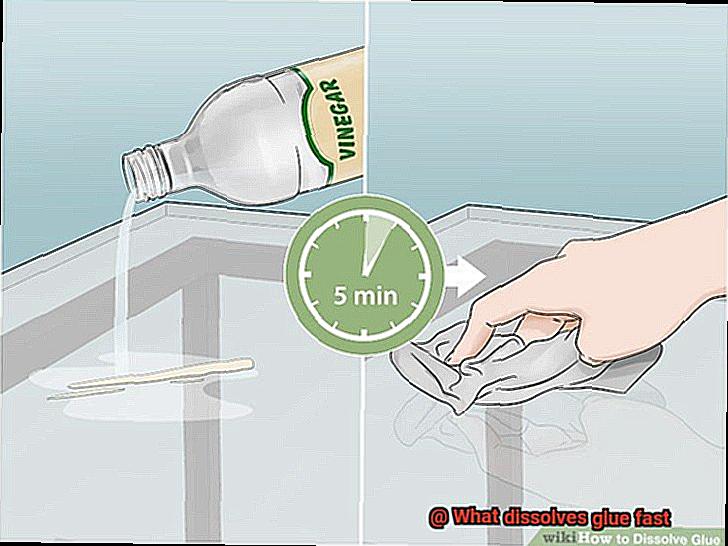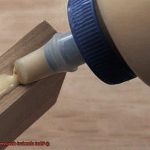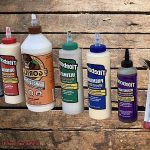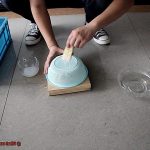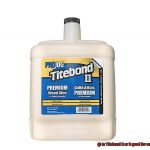Have you ever found yourself in a sticky situation, trying to remove hardened glue from a surface or tool? It can be frustrating and time-consuming, but fear not. In this blog post, I’ll share with you the most effective and efficient ways to dissolve glue fast.
Whether you’re an avid crafter or DIY enthusiast, knowing how to remove stubborn glue residue is essential. From natural ingredients like vinegar and baking soda to commercial solvents, there are several options available that can get the job done quickly and easily.
But not all solutions are created equal. Did you know that acetone is great for removing cyanoacrylate glue but can damage certain plastics? Or that rubbing alcohol is excellent for dissolving adhesive residue on glass surfaces?
In this post, I’ll guide you through the advantages and disadvantages of each solution and which types of glue they work best on. You’ll learn how to safely dissolve glue without causing any harm to the surface you’re cleaning.
So, say goodbye to sticky residue once and for all. With the knowledge and tools gained from this post, you’ll be able to tackle any adhesive mess with ease.
What is Glue?
Contents
Glue is an amazing adhesive that can be found in various forms such as liquid, gel, paste, or spray. It’s a versatile and essential item that can help you bond different materials for arts and crafts, woodworking, packaging, and construction projects.
But what makes glue so special? At its core, glue is made up of a mixture of polymers, solvents, and additives. Polymers are long chains of molecules that provide the adhesive strength. Solvents are used to dissolve the polymers and make the glue easier to apply. Additives are added to improve its properties such as viscosity, drying time, and water resistance.
There are two types of glue: natural and synthetic. Natural glues are derived from animal or plant sources such as hide glue or vegetable-based glues. Synthetic glues are made from chemicals such as polyvinyl acetate (PVA), cyanoacrylate (super glue), epoxy resin, and urethane. Choosing the right type of glue for your project is crucial in achieving a successful bond.
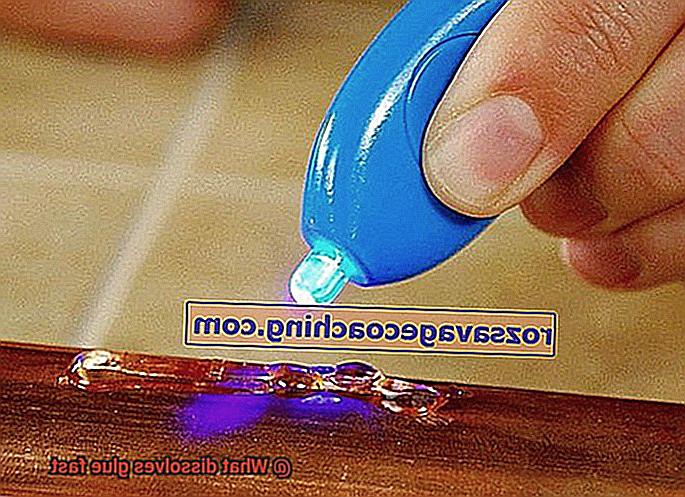
When applied, the glue starts to dry and harden, creating a strong bond between the two materials. But accidents can happen, and it may end up on surfaces where it’s not wanted. Fortunately, there are several options available for dissolving glue quickly and effectively such as acetone, rubbing alcohol, vinegar, or natural oils.
Common Solutions for Dissolving Glue
Whether it’s a crafting mishap or a spill, don’t fret. There are several common solutions for dissolving glue that can make your life easier.
One of the most powerful solutions is acetone. This mighty solvent can dissolve various types of glue, including superglue. You can find acetone in nail polish remover, making it a convenient solution that you may already have at home. Soak a cotton ball in acetone and apply it to the glue. After a few minutes, gently rub the glue away.
Another household remedy that works wonders is rubbing alcohol. It’s ideal for water-based glues, such as school glue or white glue. Dab some rubbing alcohol onto the glue and let it sit for a few minutes before wiping it away with a clean cloth.
If you’re searching for a gentler solution, vinegar may be your answer. Vinegar is a mild acid that can help dissolve some types of glue. Mix equal parts of vinegar and water and apply it to the glue. After letting it sit for a few minutes, wipe it away with a clean cloth.
Fresh spills or drips are no match for warm soapy water. This solution works best on newly spilled glue. Soak the affected area in warm soapy water for several minutes before wiping it away with a clean cloth.
Lastly, Goo Gone is a specialized product designed to dissolve adhesives and sticky residues. It’s commonly used to remove sticker residue from surfaces. Apply a small amount of Goo Gone to the glue and let it sit for a few minutes before wiping it away with a clean cloth.
Acetone: Pros and Cons
Acetone is a versatile solvent that has become a household name for its ability to dissolve glue quickly. This colorless, flammable liquid is often found in nail polish removers, paint thinners, and adhesives. Its popularity stems from its efficiency in breaking down the chemical bonds that hold glue together, making it easy to wipe away.
One of the most significant advantages of using acetone to dissolve glue is its speed. Acetone works incredibly fast, often dissolving glue in just a matter of seconds. This makes it an ideal choice for those who value time and efficiency when it comes to removing glue.
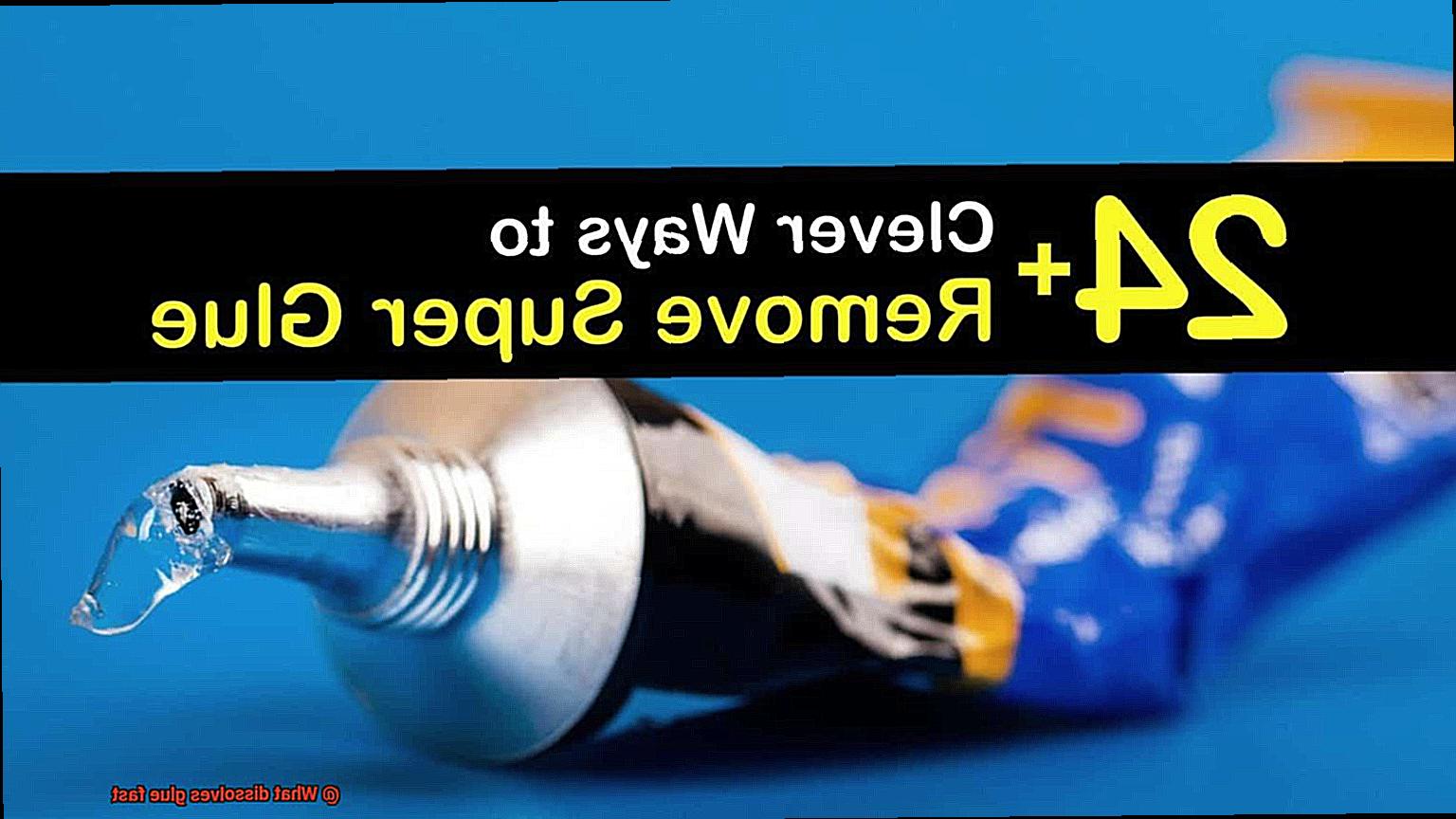
Another advantage of acetone is its availability and affordability. You can easily find acetone at most hardware stores, home improvement centers, and drug stores. It’s also relatively inexpensive, making it a cost-effective solution for removing glue.
However, there are some drawbacks to using acetone as a solvent for glue. One of the main concerns is its flammability. Acetone is highly flammable and should be handled with care. It should never be used near open flames or heat sources as this could cause a fire hazard.
Another concern with acetone is its potential to damage certain types of surfaces. Acetone can dissolve some plastics and rubber materials, so it’s important to test it in an inconspicuous area before using it on any surface. It can also damage certain types of finishes, such as lacquer or shellac.
Rubbing Alcohol: Pros and Cons
While it has its perks, there are also some downsides to using rubbing alcohol as a solvent for removing glue. Let’s dive into the pros and cons.
One of the biggest advantages of using rubbing alcohol as a glue remover is its availability and affordability. It’s a household item that you can easily find at your local drugstore or grocery store, and it’s much cheaper than specialty adhesive removers. Plus, most households already have rubbing alcohol on hand for various purposes.
Another benefit of using rubbing alcohol is that it’s safe to use on most surfaces. Unlike harsh chemicals that can damage certain materials such as plastics or fabrics, rubbing alcohol is generally safe to use on a wide range of surfaces such as metals, ceramics, and hardwoods. It’s also a non-toxic option compared to other chemical solvents that may have harmful fumes or require special handling.
However, there are also some downsides to using rubbing alcohol as a glue remover. It may not be effective for all types of adhesives. Stronger glues such as superglue may require a more specialized solvent to break down their bonds. Additionally, rubbing alcohol may not be strong enough to remove old or stubborn glue residue, which may require more intensive methods such as scraping or sanding.
Moreover, rubbing alcohol evaporates quickly, which means you may need to apply it multiple times or use a larger quantity than other solvents. This can make the process more time-consuming and less efficient.
Vinegar: Pros and Cons
Looking for a natural and safe solution to dissolve glue? Check your pantry for a bottle of vinegar. As an acid, vinegar can break down the bond between glue and surfaces. But before you start pouring, let’s explore the pros and cons of using vinegar for this purpose.
On the positive side, vinegar is a cheap and easy-to-find household item. It is also non-toxic and safe to use around children and pets. Plus, it has a pleasant odor and can be used to clean up any residue left behind after dissolving the glue.
However, there are some cons to using vinegar. First, it may not work as fast as some chemical solvents, requiring more time and effort to dissolve the glue completely. Second, vinegar might not be effective on certain types of glue like superglue or epoxy. Third, vinegar can damage certain surfaces such as wood or natural stone. So it’s crucial to test it on a small and inconspicuous area before using it on a larger surface. Lastly, vinegar can leave behind a sticky residue that may require cleaning up with soap and water.
Natural Oils: Pros and Cons
Consider natural oils. With their medicinal and therapeutic properties, natural oils have been used for centuries in aromatherapy, massage, and skincare products. And now, some natural oils have been found to be effective at dissolving glue quickly.
Coconut oil is a popular choice for dissolving glue due to its high content of lauric acid, which can break down adhesives. Plus, it’s safe to use on skin and surfaces, making it a go-to for many DIY projects. Another natural oil that works wonders on glue is olive oil. Its oleic acid boasts strong adhesive properties that can break down even the toughest bonds. And like coconut oil, it’s gentle on both skin and surfaces.
But before you grab your natural oils, consider the cons. While they are safe and effective, they may not work as well as chemical solvents. They may also leave behind an oily residue that can be tricky to clean up. And for those with allergies, some natural oils may cause reactions.
Commercial Products: Pros and Cons
Before making a decision, it’s crucial to understand the pros and cons.
One of the most significant advantages of using commercial products is their effectiveness. Designed to dissolve adhesives quickly and efficiently, they save you valuable time and effort. Plus, they’re readily available at hardware or home improvement stores, making them a convenient option for those in need of a fast fix.
Furthermore, many commercial products come with safety instructions. This is especially helpful for those unfamiliar with chemical solutions who want to avoid accidents or injuries.
But there are also some concerns when it comes to using commercial products. One major drawback is potentially harmful chemicals that may be present in these solutions. Many adhesives are made with strong chemicals, and using a commercial product to dissolve them can release even more chemicals into the air. It’s essential to read labels carefully and take proper precautions when using these products.
Another concern is the cost. Commercial products can be expensive, and depending on the size of the project, multiple bottles or cans may be required. This can quickly add up and become a significant expense.
Lastly, some individuals may have environmental concerns about using commercial products. Many of these solutions aren’t biodegradable and can harm the environment if not disposed of properly.
In conclusion, while commercial products can be an effective solution for dissolving glue quickly, it’s important to weigh the potential risks and drawbacks before making a decision. It may be worth exploring alternative methods or seeking professional help if necessary.
As we mentioned earlier, natural oils are an effective alternative solution that doesn’t compromise your health or the environment. Although not as potent as chemical solvents, their ancient healing properties and versatility make them perfect for breaking down adhesives without harming your skin or surfaces. However, keep in mind that they may leave behind a slippery residue.
g8VMrC_Jqr8″ >
Also Read: How do you remove super glue residue from rubber?
Conclusion
To sum it up, getting rid of glue residue can be a headache-inducing and time-consuming chore. But fret not, as there are several efficient and effective solutions that can dissolve glue fast. From natural ingredients such as vinegar and baking soda to commercial solvents, each solution has its own set of pros and cons.
If you’re dealing with tough adhesives, acetone is a powerful solvent that quickly dissolves various types of glue. However, it’s highly flammable and can damage certain surfaces. Rubbing alcohol is an affordable and readily available option that’s safe to use on most surfaces but may not be strong enough for older or stubborn glue residue. Vinegar is a natural and pocket-friendly solution that’s widely available but may not work as quickly as chemical solvents or could potentially harm certain surfaces.
For those who prefer gentle alternatives, natural oils like coconut oil or olive oil are excellent options that are gentle on both skin and surfaces. However, they may leave behind an oily residue. Lastly, commercial products are effective at dissolving adhesives quickly but can be pricey, harmful to the environment, and release harmful chemicals into the air.
Choosing the right solution ultimately depends on the type of adhesive you’re dealing with, the surface you’re cleaning, your budget constraints, and environmental concerns.

